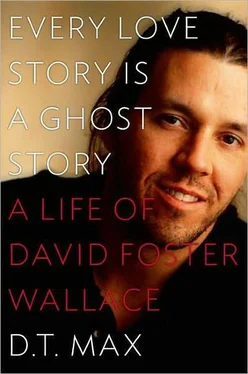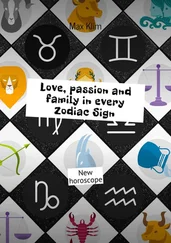4. When “Forever Overhead” was chosen for Best American Short Stories 1992 , Wallace dismissed it in his contributor note as “straining to make a personal trauma sound way deeper and prettier and Big than anything true could ever really be.”
5. When Mary Carter died in 2011, many of Wallace’s fellow classmates were surprised to find that she had been in her sixties at the time she ran the writing program.
6. “I completely deny ever once kissing any part of my sister’s feet at any time whatsoever,” Wallace wrote in his contributor note for “Forever Overhead” in Best American Short Stories 1992 , setting that record straight at the same time as he claimed the “excruciatingly shaming” trauma of panicking on the top of the high dive for himself, when the person who froze atop the high dive, according to his family, was actually his mother.
7. Though never a Zumbye, Wallace enjoyed singing songs from their album in the shower, especially “Tears of a Clown” and “Since I Fell for You.”
8. Minimalism was political too, practically the literary world’s univocal response to the Reagan era, as if the cuts in budgets had trimmed countless words and emotions from writers’ vocabularies at the same time.
9. When Wallace brought up Derrida and De Man, from his literary theory class, to support his respect for brat pack writers, Elman said he didn’t care. He derided him as Herr Doktor Wallace, as Wallace’s face flushed and his voice rose. Afterward, Wallace worried that he had transgressed and speedily wrote Elman an apology, explaining he was “passionately interested in this stuff, and I’m afraid I sometimes forget where I am and whom I’m talking to.”
10. The evident comic appeal of the excerpt is why Wallace’s agent Bonnie Nadell later suggested that he begin the book with it, rather than the original opening, a conversation between Lenore and her great-grandmother that was eventually cut.
11. Wallace’s readings in literary theory hang heavily over the story, especially his fascination with Derrida. For Wittgenstein language was speech and without a speaker there could be no meaning. By contrast, Derrida insisted that writing was no less fundamental to language and the absence of the speaker/author was precisely what allowed the reader to assert the meaning of the written words — Derrida’s famous dictum that “there is nothing outside the text.” In creating a character who is all disembodied speech in a written narrative, Wallace was joining the two approaches.
12. These are Penner’s notes. He says he would in the actual class have expressed himself more diplomatically.
13. Penner told Wallace that the fantastical ending of “Solomon Silverfish” was too short, the rest too long, showing he was a more complicated reader than Wallace gave him credit for. All the same, the students had no doubt where his heart lay. “Penner,” Robert Boswell remembers, “was really uptight about what was and what wasn’t a story; he was the worst person to work with David.”
14. Penner has a different interpretation of these words. “As I interpret them,” he says, “they mean we’d hate to lose him as a real writer, hate to see him sink to a trivial level. I don’t remember telling David that, but I certainly felt it.”
15. A small print run of hardcovers, now extremely valuable, was also planned, under the Viking imprint.
16. Soon after selling the book, Wallace confessed to Corey Washington his fear that “only me and Mom will buy the book…and my name will be economic and literary mud — even shit.”
17. “…so that word and reference are unified…in absence,” Wallace noted to Nadell happily.
18. “He was very polite in ignoring me” is Howard’s too-modest memory of his editorial interactions with Wallace. He told Leon Neyfakh of the New York Observer after the writer’s death, “I’m sure I may have changed a comma to a semicolon or maybe fixed a couple of words in Broom of the System but yeah, he knew what he was about, David, even if I didn’t.”
19. The name of another musician from Placebo Records, Michael Pemulis, would later attach to an important character in Infinite Jest .
20. Wallace appended a note on the copy of the story he circulated in his workshop apologizing if the story offended and asking if the grotesqueries seemed unnecessary, because “that would obviously be bad narrative news.”
21. Carter made no effort to hide who her favorites were at the event. While she walked Wallace around, she asked Heather Aronson to serve hors d’oeuvres.
22. Julie’s autistic brother lives in Tucson. The two children are premature adults, abandoned by their parents and largely ignored by their foster parents (pun surely intended). The setup suggests how upset the fracture in his parents’ marriage may have left Wallace.
23. There may also, as ever, have been an element of parody to the story, Wallace trying out the sort of heartfelt encounter that teachers like Penner admired. (If so, it did not work. When he submitted it to his fiction workshop the instructor, Buzz Poverman, another teacher who favored realism, told him, others in the class remember, that it was “not a story.”)
24. In the interview Wallace gave to Larry McCaffery, he made a try at explaining the dynamic of his surprising public success: “I’m an exhibitionist who wants to hide, but is unsuccessful at hiding; therefore, somehow I succeed.” He cut the comment before the interview was published in 1993.
25. The story went through a number of intriguing titles before settling on “My Appearance.” Wallace called it at various times “40,” a reference to the actress’s age, “All Things to One Man,” “Lettermania,” and “Late Night.”
26. Wallace’s acceptance to Yaddo showed some of his academic sleight of hand. Richard Elman was one of his recommenders. “I’ll shine your shoes for a week,” he’d written his old teacher, asking for his help. He’d also asked Jonathan Penner, who wrote a glowing endorsement.
Chapter 4: Into the Funhouse
1. Wallace may have first encountered the poem in the famous early advertisements for a farm implement, which he knew:
The Plough That Broke the Plains…McCormick Reaper
Westward the Course of Empire Takes Its Way
He was also aware of the painting by Emanuel Leutze that hangs in the Capitol.
2. The fried roses, whose “noisomely oily smell” Wallace confirmed on the family stove, was central enough to his thinking that he chose it for the title of the story and the collection, until Nadell objected.
3. Wallace told Costello that another character in the story, Magda, the orange-faced stewardess—“an aloft waitress, she terms it”—of the story, came from real life. While he was working on “Westward,” a flight attendant who was a fan of postmodernism recognized him from the sketch the Wall Street Journal had published alongside their article. She took him to her condo in Hartford for three days.
4. The passsage plays off Barth’s own essays on literature and generational conflict with their premise that the aesthetic of modernism was no longer useful and something new had to be found.
5. He would add in a 2002 letter to the critic Marshall Boswell, in the course of his by then customary putdown of The Broom of the System , “The best thing to come out of that was that I still have the same agent, and she’s a dear friend and merciless critic.”
6. He would later speak of “sort of an artistic and religious crisis” in these months, words reminiscent of his description of the breakdown that first spurred his creativity at Amherst in 1983.
7. He usually drank alone until he lost consciousness. He would describe himself in a later interview as “sort of a joyless drinker.”
Читать дальше












